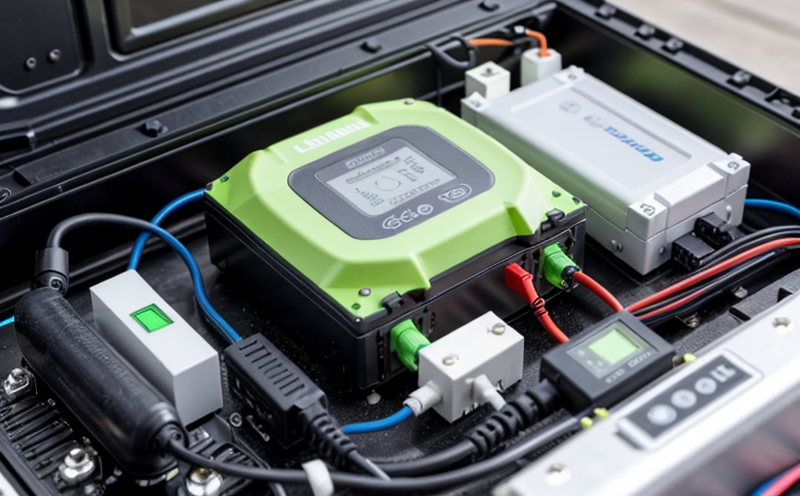ASTM F3117 Lithium-Ion Primary Cell Testing for Medical Applications
The ASTM F3117 standard is specifically designed to ensure that lithium-ion (Li-ion) primary cells used in medical devices meet the highest levels of safety and performance. This stringent testing protocol is crucial for ensuring reliability, consistency, and compliance with international standards.
ASTM F3117 covers a wide range of test methods aimed at evaluating various aspects of Li-ion primary cells intended for use in medical applications. These tests are essential to identify any potential risks that could arise from the cell's design or manufacturing process. The standard is applicable not only to manufacturers but also to suppliers and end-users, ensuring comprehensive quality assurance across the entire supply chain.
The testing protocol encompasses multiple phases, including physical and electrical characterization, as well as thermal stability assessments. Physical tests may include dimensional checks, mass measurement, and visual inspection. Electrical parameters such as internal resistance, open circuit voltage, and short-circuit current are also evaluated to ensure the cell operates within safe limits.
Thermal testing is a critical component of ASTM F3117, focusing on the cell's ability to withstand extreme temperatures without degrading performance or posing safety risks. This includes tests for thermal shock, temperature cycling, and forced convection cooling. Additionally, the standard requires evaluation of self-heating and heat release rates under various conditions.
The results from these comprehensive tests provide valuable insights into the reliability and safety of Li-ion primary cells used in medical devices. By adhering to ASTM F3117, manufacturers can ensure that their products meet rigorous performance standards, thereby enhancing patient safety and device efficacy.
- Physical characterization
- Electrical parameter evaluation
- Thermal stability assessments
- Self-heating and heat release rate analysis
The detailed nature of ASTM F3117 ensures that healthcare providers, regulatory bodies, and patients can have confidence in the safety and effectiveness of medical devices powered by Li-ion primary cells. Compliance with this standard is essential for companies operating within the medical device sector.
In summary, ASTM F3117 provides a robust framework for evaluating Li-ion primary cells used in medical applications. By following these stringent test protocols, manufacturers can ensure that their products meet international standards and are safe for use in healthcare settings.
Eurolab Advantages
At Eurolab, we pride ourselves on providing top-tier testing services tailored to the unique needs of the medical device industry. Our expertise in ASTM F3117 Lithium-Ion Primary Cell Testing ensures that our clients receive accurate and reliable results.
- Comprehensive Testing Capabilities: We offer a full range of tests specified by ASTM F3117, ensuring thorough evaluation of Li-ion primary cells.
- State-of-the-Art Equipment: Our laboratory is equipped with the latest instrumentation and technology to perform precise and accurate testing.
- Experienced Professionals: Our team comprises highly skilled engineers and technicians who are well-versed in ASTM F3117 requirements.
- Rigorous Quality Control: We maintain strict quality control measures to ensure consistent and reliable test results.
- Compliance Assurance: Eurolab's testing services help clients stay compliant with international standards, including ASTM F3117.
- Prompt Reporting: Our fast turnaround times allow you to receive timely reports, enabling quicker decision-making processes.
With Eurolab, you can rest assured that your Li-ion primary cells will undergo rigorous testing, ensuring they meet the highest safety and performance standards required for medical applications. Contact us today to learn more about how we can assist with ASTM F3117 Lithium-Ion Primary Cell Testing.
Quality and Reliability Assurance
The quality and reliability of Li-ion primary cells used in medical devices are paramount, as even the slightest deviation from safety standards could lead to serious consequences. Here at Eurolab, we take a multi-faceted approach to ensure that our testing meets or exceeds industry expectations.
- Stringent Testing Protocols: We adhere strictly to ASTM F3117 and other relevant international standards, ensuring comprehensive evaluation of Li-ion primary cells.
- Precision Instruments: Our laboratory is equipped with high-precision instruments capable of detecting even the minutest variations in test parameters.
- Consistent Results: Eurolab's quality control measures ensure that each test yields consistent and reliable results, minimizing variability.
- Expertise and Experience: Our team comprises experts with extensive experience in medical device testing, providing unparalleled knowledge and insight.
- Compliance Verification: We verify compliance with international standards to ensure that your products meet the required specifications.
- Prompt Reporting: Timely reports allow for rapid identification of any issues and prompt corrective actions.
By leveraging Eurolab's advanced testing capabilities, you can be confident in the quality and reliability of Li-ion primary cells used in your medical devices. Our commitment to excellence ensures that your products are safe, effective, and compliant with industry standards.
International Acceptance and Recognition
The ASTM F3117 standard for Lithium-Ion Primary Cell Testing is widely recognized and accepted internationally, ensuring a consistent approach to quality control across borders. This standard is embraced by regulatory bodies, manufacturers, and suppliers worldwide, making it an essential tool in the medical device industry.
Regulatory agencies such as the FDA (Food and Drug Administration) in the United States, the EMA (European Medicines Agency), and similar organizations around the globe rely on ASTM F3117 to assess the safety and performance of Li-ion primary cells used in medical devices. This widespread acceptance underscores the importance of adhering to this standard.
By participating in ASTM F3117 testing, manufacturers can ensure that their products meet global standards, facilitating easier market access and regulatory compliance. The consistent application of these tests across different regions ensures a level playing field for all stakeholders involved in the medical device industry.
The recognition of ASTM F3117 extends beyond mere compliance; it also fosters trust among healthcare providers, patients, and regulatory authorities worldwide. This standard serves as a benchmark for excellence, ensuring that Li-ion primary cells used in medical devices are safe, reliable, and effective.





